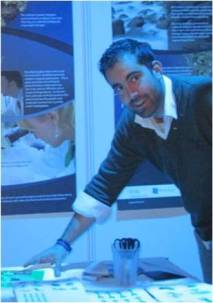On my last blog I tried to briefly discuss the issues of primary level science. I brought you the words of Dr. Ed Walsh, regarding this  issue, but I purposely left a part behind. I left it because I want to use it to introduce this weeks’ blog. When trying to find short term answers to the issues that primary level science faces, whilst the long term ones are being developed, Dr. Ed Walsh gives his insight:
issue, but I purposely left a part behind. I left it because I want to use it to introduce this weeks’ blog. When trying to find short term answers to the issues that primary level science faces, whilst the long term ones are being developed, Dr. Ed Walsh gives his insight:
“There are many people conducting very exciting PhDs. If the unions will permit it, why not offer them an attractive rate to come into classrooms and share some of their findings?”
Well, the economy of today does not allow us to think on paying PhD students to do science outreach, but the matter of fact is that Universities and other organizations (tech companies for instance) are getting much more aware of the role they need to have in engaging students with science. The Neuroscience editor on this issue has dedicated an editorial to it, and he states:
“Recently, many more scientists have become involved in attempts to improve public science education. Programs designed either to provide basic science content and creative science teaching tools to teachers or to encourage scientists to form partnerships with their local schools have mushroomed”
He is referring here to the reality in the USA, but Ireland is not that different. If you visit websites of science departments of various Irish Universities you discover amazing science outreach work that is being developed throughout the country. Complementary to this, organizations like Engineers Ireland and several major enterprises present in Ireland are also developing very interesting work in science outreach. The Cork Outreach Community is an amazing example of this, the work they develop is really impressive, as is the passion that drives the people behind it, as I was able to discover in their presentation in the 2011 Communicating STEM conference.
These informal Science Outreach programs are then a reality in a great number of primary schools and the formal sector of science education cannot ignore it. Historically the informal sector and the formal sector did not cross. Scientists, engineers and others that develop outreach usually did not engage with educational researchers. Fortunately the tide is turning, and research is now being performed in the crossing between these two sectors. This can only benefit both sides. As the European Union report Science Education Now states:
“Community support can be instrumental, not only in accelerating the pace of change, but also in enriching the newly developed techniques. The participation of all stakeholders, including experts of SE, teachers, students, parents, scientists, engineers and their organizations, including schools, teacher and parent organizations, universities, research institutes, Science museums, Science centres, firms and local authorities is a key factor for the success”
So, in the next years science outreach will probably become an even more present reality in schools which can assist science education in engaging students with science.
Notwithstanding the positive effects it can have, of course science outreach is not a perfect solution and it will not fix the issues that science education faces. Science outreach developers are well aware of that. There are also challenges and problems in science outreach, but I’ll talk about it more in one of my next blogs.